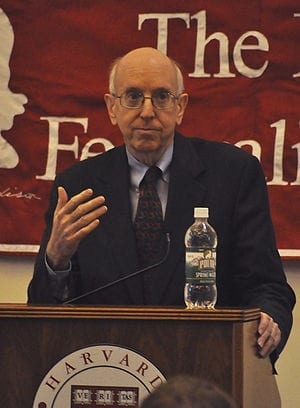“I decided it would be fun to do patent trials,” said Richard Posner.
We were sitting in his spacious office in the federal courthouse in downtown Chicago, where, for more than three decades, Posner, 74, has been a judge on the United States Court of Appeals for the Seventh Circuit. Posner is one of the most prolific writers in the country, not just of legal opinions but of books and articles on a staggering variety of subjects.
He is also one of the most highly regarded appeals court judges. His first book, “Economic Analysis of Law,” written in 1973, “showed how economic principles could be fruitfully applied to many legal problems,” as the legal writer Roger Parloff once put it in Fortune magazine. It has had a profound effect on the law.
In recent years, Posner has done something you don’t see appeals court justices do very often. He has volunteered to serve as a district judge in lawsuits involving patent claims. One case, Apple v. Motorola Mobility, was a high-profile smartphone lawsuit. The other, Brandeis and GFA Brands v. Keebler, involved a patent for cookie formula, and was mainly of interest to the patent cognoscenti.
But “fun” is hardly Posner’s only motive. To put it more bluntly than he ever would, he is adjudicating patent cases in an effort to change a legal system that now gives companies rich incentives to bring costly, time-consuming and often prideful patents lawsuits. It desperately needs to be done.
America’s patent system is a mess. The United States Patent and Trademark Office, understaffed and overwhelmed, issues too many needless patents. Patent trolls buy or create patent portfolios whose only purpose is to extort fees from the companies that actually make the things that the patents supposedly cover. Technology companies sue competitors for billions for infringing patents that are nothing short of silly — the rounded corners on the iPhone, for instance. Google spent $12.5 billion to buy Motorola Mobility in no small part to get its patent portfolio, which became a legal weapon.
In Posner’s view, many patents are unnecessary. Patents, he believes, are important for drug companies that spend hundreds of millions of dollars bringing a new drug to market — a drug that can easily be copied by a competitor. Without the protection that a patent affords, pharmaceutical companies would have far less incentive to come up with new drugs.
via The New York Times – JOE NOCERA
The Latest Streaming News: Patent wars updated minute-by-minute
Bookmark this page and come back often
Latest NEWS
Latest VIDEO










